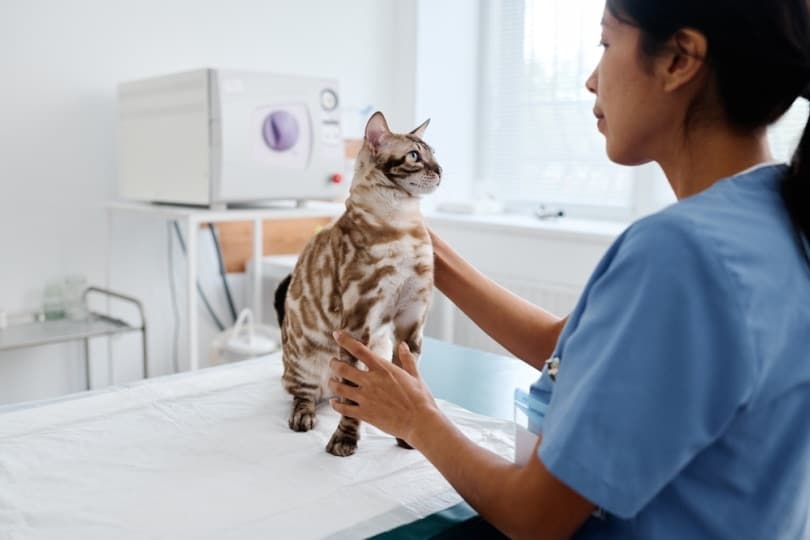Roundworms in Cats: Causes, Signs & Care (Vet Answer) - Catster
We occupy the planet with all sorts of creatures, and whilst we don't particularly like to think about it, worms appear to believe that our pets (and even us!) make comfortable and nourishing homes in which they can thrive. However, unfortunately, this belief isn't reciprocated by their hosts, and worms can have deleterious consequences for our feline friends.
Roundworms are one of the more common intestinal parasites found in cats, so it is important for them to be on a cat owner's radar. Continue reading to learn more!

What Are Roundworms in Cats?
Roundworms are a common parasite that takes residence in the intestines of cats. This is the perfect location for roundworms to settle down, where they can consume the food that has been broken down and digested by the cat's stomach, grow into adults, and continue their lifecycle. Roundworms are large white or light-brown worms that average 3–6 inches long and can sometimes be clearly seen with the naked eye in a cat's vomit or feces. However, often, we may never see them.
There are numerous species of roundworms, with two species causing illness in cats: Toxocara cati and Toxocara leonina. Rather alarmingly, almost all cats will become infected with roundworms during their lives.




What Are the Signs of Roundworms?
Healthy adult cats may never show signs of roundworm infection. However, a large worm burden in young kittens, elderly cats, or those with underlying health issues may be extremely harmful and sometimes life-threatening. Clinical signs to look out for include the following:
- Vomiting and diarrhea
- Weight loss
- Lethargy and fatigue
- A pot-bellied appearance
- A dull, lackluster coat
- Poor growth
- Coughing
- Pneumonia
What Are the Causes of Roundworms?
When understanding the cause of roundworms, it is helpful to have a brief background in its lifecycle, a clever feat of biology that ensures their continued survival in the animal kingdom.
Let's start with the adult worm swimming freely in the intestine of your cat. Once this adult roundworm reaches maturity, it will pass eggs in the feces of the cat. This egg contains the embryonic worm, and now, in the environment, will spend 2–4 weeks developing into larvae before it is able to infect a new "host" or cat.
These eggs are extremely hardy and can remain infectious in the environment for months or years. This means that even once the feces have dissolved into the soil, the worm eggs remain within the ground, able to infect any cat that happens to encounter, then ingest, it.
However, they can also infect other animals, such as rodents or birds, which act as "transport" hosts. The larvae will not develop into mature adults within these animals, but they are able to remain encysted within their tissues, waiting for the time when an unsuspecting cat will ingest the transport host and become infected.
Once inside the cat's body, the larvae don't immediately settle in the intestine but migrate to the liver (where they will go dormant and form cysts) and the lungs. In the lungs, they will continue their development, burrowing into the small airways before traveling up to the throat, where they are coughed up and swallowed back into the intestinal tract. Now we are back where we started: the worms will mature into adults, ready to release eggs and begin the lifecycle all over again.
If the infected cat is a pregnant or nursing mother, they can also migrate to the mammary glands, where they will infect nursing kittens through the milk.




How Do I Care for a Cat With Roundworms?
If you suspect that your cat has worms, then it is important to seek veterinary attention. Thankfully, the treatment for roundworms is relatively simple and cost-effective, and your vet will prescribe the appropriate dewormer designed to kill the adult worms in the intestines.
Because the dewormer does not act upon the migrating larvae in the lungs, two or three doses of the medication are required, typically administered at 2–3-week intervals. In kittens and pregnant mothers, it is especially important that they are given worming medication, so talk to your veterinarian about the correct protocol for prevention. Similarly, all adult cats should be on a worming prevention protocol, and this is normally covered at your cat's annual health check and booster vaccinations.
For prevention, it is important to ensure that any litter trays in the house are cleaned daily and disposal of any feces in the garden or play areas is undertaken.


Frequently Asked Questions
Can Humans Catch Roundworms from Cats?
Roundworms can have an impact on human health. It is thought that the incidence of Toxocara cati in humans has been underestimated, and children are especially vulnerable to health implications should they be infected by roundworms. The immature stages of the worm—the larvae—can cause cysts in various organs and, rarely, blindness.
Therefore, especially in households where cats cohabit the home with children, it is important that the cats are on appropriate parasite prevention. Children should not have any access to litter trays and, ideally, no access to areas where the cat toilets outside. This can obviously be difficult in a yard, where large numbers of eggs can accumulate in the soil, so ensure that the children have a strict hand washing routine after playing. Be mindful of the risks of children playing in uncovered sandpits and parks.


How Are Roundworms Diagnosed in Cats?
Your veterinarian will be able to confirm infection through a test called a "fecal flotation test". A sample of your cat's stool will be mixed with a solution that allows the eggs to float to the top of the solution, where they are able to be sampled onto a glass slide and inspected under a microscope. Worm eggs all have different characteristics which allow for appropriate identification. So, whilst they may be clever little creatures, the human curiosity to understand this microscopic world has given us the ability to be able to treat parasites effectively.



Conclusion
Despite the general shudder that goes down our spines when we think about worms occupying our cat's bodies, roundworms pose an important health risk that demands our attention spans long enough to consider appropriate preventative measures. If you are a cat owner, then it is important to ensure that your cat is receiving regular de-wormer, especially if you have recently acquired a kitten or are responsible for a pregnant or nursing queen. Roundworm infection can be insidious and go completely unseen, so as always, I'll leave you with a veterinarian's favorite advice: prevention is better than cure!
Featured Image Credit: Kristi Blokhin, Shutterstock
Comments
Post a Comment